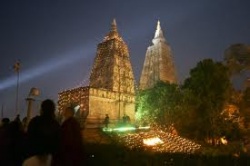Difference between revisions of "Gaya"
(Created page with "thumb|250px| <poem> Gaya [伽耶城] (Skt, Pali; Jpn Gaya-jo) A city of the Magadha kingdom in ancient India, south of Pataliputra (presen...") |
|||
| (3 intermediate revisions by the same user not shown) | |||
| Line 1: | Line 1: | ||
[[File:1Mahabodhi.jpg-es.jpg|thumb|250px|]] | [[File:1Mahabodhi.jpg-es.jpg|thumb|250px|]] | ||
| + | |||
| + | |||
| + | |||
| + | |||
| + | |||
<poem> | <poem> | ||
| − | Gaya | + | [[Gaya]] |
| − | [伽耶城] (Skt, Pali; Jpn Gaya-jo) | + | [[伽耶城]] (Skt, [[Pali]]; Jpn [[Gaya-jo]]) |
| − | + | 1) A city of the [[Magadha]] {{Wiki|kingdom}} in {{Wiki|ancient India}}, {{Wiki|south}} of [[Pataliputra]] (present-day [[Patna]]) on the [[Ganges]] [[River]]. | |
| + | |||
| + | Present-day [[Gaya]] is located in {{Wiki|central}} {{Wiki|Bihar}}, a state in northeastern [[India]]. | ||
| + | |||
| + | Today it is a center of [[Hindu]] [[belief]] that attracts many [[pilgrims]]. | ||
| + | |||
| + | There are numerous {{Wiki|Hindu temples}} in the city, and the [[principal]] [[shrine]] is the [[Vishnu]] [[temple]]. | ||
| + | |||
| + | |||
| + | |||
| + | [[Gayawas]] formerly a center of [[Buddhism]], but from the second through the fourth century, [[Hinduism]] gradually displaced [[Buddhism]]. | ||
| + | |||
| + | Near the city, however, are a number of sites associated with [[Shakyamuni Buddha]], such as [[Buddhagaya]](now [[Bodh Gaya]], also called [[Buddh Gaya]]), where [[Shakyamuni]] [[attained]] [[enlightenment]], | ||
| + | |||
| + | and [[Mount Gayashirsha]] (the hill now called [[Brahmayoni]] or [[Brahmajini]]), where the [[Buddha]] is believed to have {{Wiki|preached}}. | ||
| + | |||
| + | |||
| + | |||
| + | 2) [[Gayā-Kassapa]]; [[Kasyapa]] brother; [[Mahakashyapa]] | ||
</poem> | </poem> | ||
{{R}} | {{R}} | ||
[http://www.sgilibrary.org/search_dict.php?SearchSelect=dict&p=5&m=1&in=2&q=Enlightenment www.sgilibrary.org] | [http://www.sgilibrary.org/search_dict.php?SearchSelect=dict&p=5&m=1&in=2&q=Enlightenment www.sgilibrary.org] | ||
[[Category:Buddhist Terms]] | [[Category:Buddhist Terms]] | ||
| − | + | ||
| − | [[Category: | + | [[Category:Gaya]] |
Latest revision as of 15:50, 26 November 2015
Gaya
伽耶城 (Skt, Pali; Jpn Gaya-jo)
1) A city of the Magadha kingdom in ancient India, south of Pataliputra (present-day Patna) on the Ganges River.
Present-day Gaya is located in central Bihar, a state in northeastern India.
Today it is a center of Hindu belief that attracts many pilgrims.
There are numerous Hindu temples in the city, and the principal shrine is the Vishnu temple.
Gayawas formerly a center of Buddhism, but from the second through the fourth century, Hinduism gradually displaced Buddhism.
Near the city, however, are a number of sites associated with Shakyamuni Buddha, such as Buddhagaya(now Bodh Gaya, also called Buddh Gaya), where Shakyamuni attained enlightenment,
and Mount Gayashirsha (the hill now called Brahmayoni or Brahmajini), where the Buddha is believed to have preached.
2) Gayā-Kassapa; Kasyapa brother; Mahakashyapa
